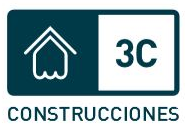





Keep this story going! Share below!
The proposal of 3C is disruptive innovation that builds houses with reused PET and polyethylene waste through a mixed construction method, resulting in finished houses similar to conventional ones, with high thermal insulation and fire resistance.
The business is also socially innovative, as it is implemented through solid partnerships, between 3C, NGOs and cooperatives, as well as with municipalities, neighborhoods and universities.
Through these alliances, 3C helps reducing poverty and plastic pollution as well as the use of water and energy in the construction industry and in the operation of buildings.
From a technical standpoint the business takes advantage of the sophisticated molecular structure of a material (PET and polyethylene) produced through a complex technological process -which is massively discarded under the "business as usual" paradigm and which abounds in marginal areas- to manufacture blocks for the walls of houses which have a high performance in thermal insulation and fire resistance.
By applying a simple mechanical method, it saves between 15% and 20% in costs and reduces the time of construction of a standard house of 73.8 sq. m. from around a year to between 4 to 6 months.
From the social point of view, the innovation relies on partnerships working as follows:

The entrepreneur, Lucas, worked in marginalized social communities, where plastic waste was abundant and people were unemployed. So he started to wonder "how to create a link between them to reduce unemployment, poverty and pollution".
That question led him to develop an easy-to-implement technology to reuse plastic waste in the construction of houses, as well as to involve the local priest, Mariano Oberlín -head of the Foundation Yayaicú-, who work in the area with people who were unemployed.
As a result, they started working together, providing jobs for these people and applying the technology of 3C.
The innovation of 3C has triggered the following impacts:
Environmental
Social
Economic
Thanks to the technical and social innovations applied, the business has constructed 36 buildings since 2016 and has 5 houses under construction.
Moreover, 3C joined the digital platform "Impacton", where it offers to transfer its industrial and social technology to foreign entrepreneurs by payment of a royalty.
Through this process, the business entered new markets in South America and Africa, being Chile, Brazil and Cameroon the first pilot cases.
3C technologies collaborated to decrease GEI emissions in a context where the construction industry accounted for 10% of global energy-related CO2 emissions and, together with the operation of buildings, generated 38% of such global emissions in 2019, according to the 2020 Global Status Report for Buildings and Construction issued by the Global Alliance for Buildings and Construction at the United Nations Environment Programme.
On the other hand, 42% of people in Argentina lived below the poverty line in 2020, according to the 2021 INDEC's report. Under this dramatic scenario, 3C generated quality jobs for people in vulnerable situations, empowering their communities and reducing social inequalities.
In turn, the business is aligned with the circular economy model by optimizing resources, giving a new life to plastic by reinserting it, as well as people, into the productive system.
Get stories of positive business innovations from around the world delivered right to your inbox.
Lucas Recalde, Founding Partner


3C Construcciones is an innovative venture that -through partnerships with NGOs, cooperatives, municipalities and universities- builds multipurpose spaces and housing in Argentina, using PET and polyethylene waste, which are reused by taking advantage of their sophisticated technical properties in the construction of blocks that will form walls, minimizing the use of water and electricity.
The business articulates industrial and social technologies, generates economic benefits from what is considered waste, includes people facing vulnerable situations into the labor market and develops a productive network that strengthens communities.
The constructions method fit into the concept of "passive houses" (low consumption housing) as they do not require air conditioning or heat. Reducing energy consumption, maintenance fees and GHG emissions